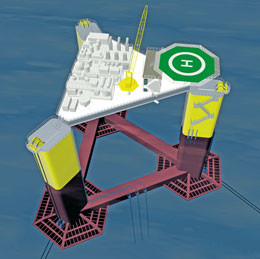Difference between revisions of "MiniFloat"
(New page: [http://www.marineitech.com/index.php?option=com_content&view=article&id=46&Itemid=55 MiniFloat] is a relatively small floating platform designed by MI&T. It has explicitly been designed w...) |
|||
| (One intermediate revision by one other user not shown) | |||
| Line 1: | Line 1: | ||
| + | [[Image:Minifloat.jpg|right|275px]] | ||
[http://www.marineitech.com/index.php?option=com_content&view=article&id=46&Itemid=55 MiniFloat] is a relatively small floating platform designed by MI&T. It has explicitly been designed with the goal of combining small scale and acceptable motion performance in mind. | [http://www.marineitech.com/index.php?option=com_content&view=article&id=46&Itemid=55 MiniFloat] is a relatively small floating platform designed by MI&T. It has explicitly been designed with the goal of combining small scale and acceptable motion performance in mind. | ||
It can be regarded as a [[Design Features#Sparse Footprint|Sparse Footprint]] design with [[Design Features#Heave Plates|Heave Plates]] for improved heave stability. | It can be regarded as a [[Design Features#Sparse Footprint|Sparse Footprint]] design with [[Design Features#Heave Plates|Heave Plates]] for improved heave stability. | ||
| + | |||
| + | Extensive model testing has been performed, but no platforms of this kind have been built yet. No cost estimates are currently available. MiniFloat is patented, but for oil&gas / industrial applications, so this should not interfere with residential applications. | ||
Latest revision as of 20:28, 16 October 2009
MiniFloat is a relatively small floating platform designed by MI&T. It has explicitly been designed with the goal of combining small scale and acceptable motion performance in mind.
It can be regarded as a Sparse Footprint design with Heave Plates for improved heave stability.
Extensive model testing has been performed, but no platforms of this kind have been built yet. No cost estimates are currently available. MiniFloat is patented, but for oil&gas / industrial applications, so this should not interfere with residential applications.
